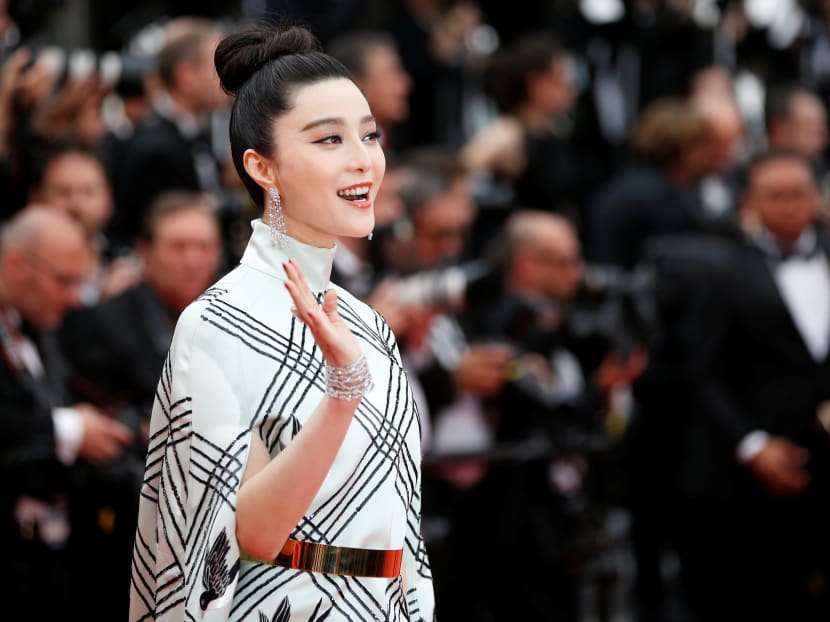China may come to regret dimming its biggest stars
Fan Bingbing, China's most popular actress, has not been since in public since early June after being caught up in a tax-evasion scandal and, more importantly, a government campaign to slash the influence of China's celebrities. Her disappearance raises serious questions about whether China can create an entertainment industry that challenges Hollywood.

Fan Bingbing, seen here at the 70th Cannes Film Festival in 2017, has 63 million followers on Weibo and high-profile endorsement deals with some of the world's most prominent luxury brands.
By late spring, Fan Bingbing, China's most popular actress, had become a cultural juggernaut.
She had 63 million followers on Weibo, China's Twitter-like social network, and high-profile endorsement deals with some of the world's most prominent luxury brands.
Besides roles in major Chinese and Hollywood films, she’d just enjoyed a prestigious turn as a juror at the Cannes Film Festival.
If Anne Hathaway and the Kardashians merged, they would still have fallen short of Fan’s ubiquitous stardom.
That’s all been snuffed out now, thanks in part to a tax-evasion scandal and, more importantly, a government campaign to slash the influence of China's celebrities.
As Bloomberg News reported this week, Ms Fan hasn't been seen in public since early June.
Beyond the star’s personal fate, her disappearance raises serious questions about whether China can create an entertainment industry that challenges Hollywood.
When Chinese President Xi Jinping became China's top leader in 2012, China's film industry was on the upswing.
Box office revenues had grown 31 per cent over 2011, surpassing Japan's and establishing China as the world's No 2 movie market.
While Hollywood films still dominated, China's filmmakers were finally challenging them for a share of the domestic box office.
"Lost in Thailand," an earthy 2012 comedy in which Ms Fan played herself, became China's highest-ever grossing film.
In a China where cash is king, that should have been cause for celebration.
Party leaders, however, had two issues with the celebrity-driven, audience-pleasing turn in popular entertainment.
First, it seemed vulgar and out-of-tune with the ideologically-minded art that top officials claimed to prefer.
In a notorious 2014 speech on the arts, Mr Xi singled out for criticism artists who "indulge in kitsch, are of low taste and have gradually turned their work into cash cows, or into ecstasy pills for sensual stimulation."
In his view, art and culture will have fulfilled their proper social role when "the Marxist view of art and culture is firmly established and the people are their focus."
Second, the Party prefers not to share the stage with anyone. That's becoming a greater challenge every day.
The internet has enabled a deep and lucrative celebrity culture that spans social media, filmed and live entertainment, and gossip sites. That might not be a problem if Chinese film stars were dull and conservative.
But, like their Hollywood counterparts, many prefer money, over-the-top extravagance and other, er, indulgences that don’t necessarily promote the same values the Party would prefer to inculcate in citizens.
Last fall, the Communist Party-owned Global Times newspaper complained that "it's unfair that these stars accrue such glory, unimaginable to those who have made a decisive contribution to the country."
An accompanying crackdown has been underway since at least 2016, when China's top media regulator ordered broadcasters to avoid glorifying celebrities and wealth.
It continued last summer with a government directive ordering websites "to contain the glorification of scandals and the private lives of celebrities, the sensationalisation of their conspicuous consumption and low taste."
The latter order led to the shuttering of sites and social media accounts focused on celebrity gossip and lifestyles.
Two months later, China's top media regulator issued a new set of guidelines that -- among other items -- prohibited TV shows which might be viewed as "particularly entertaining” or in which "average people are portrayed secondary to celebrities.”
It was just a matter of time before celebrities themselves became a focus of the crackdown.
Fan Bingbing made for an ideal target: As the face of Chinese celebrity, an effort to bring her low would scare other stars straight (a Chinese tactic known as "killing the chicken to scare the monkey").
A long-standing Chinese film industry practice of issuing two contracts for star performers, one of which remains secret for tax purposes, served as her downfall.
News of her alleged tax evasion (and high pay) caused widespread public outrage and badly dented her image and marketability.
Even without that particular scandal, the government would likely have found another excuse to target her.
Last week, the Party-controlled Chinese Academy of Social Sciences released an assessment and ranking of the "social responsibility" exhibited by China's Top 100 celebrities.
Ms Fan, unsurprisingly, ranked dead last.
Only nine stars "passed" the assessment at all and the Chinese government appears determined to rein them in as well.
In recent months, it has issued directives and forged agreements with top production companies to cut the pay of China's top stars. Its investigation into film contracting practices (and tax evasion) is only getting started.
Few in China would argue that lawlessness, even among movie stars, should be tolerated.
But the effort to diminish China's most popular celebrities to make way for lower-cost, government-approved messaging and entertainers is more problematic.
China's filmmakers, already struggling, will have trouble competing at home, let alone abroad, if they’re forced to use dull, ideologically pure actors and storylines.
If China really wants to challenge Hollywood on a global stage, it’s going to have to let its biggest stars shine. BLOOMBERG
ABOUT THE AUTHOR:
Adam Minter is an American writer based in Asia, where he covers politics, culture and business. He is the author of Junkyard Planet: Travels in the Billion-Dollar Trash Trade.






